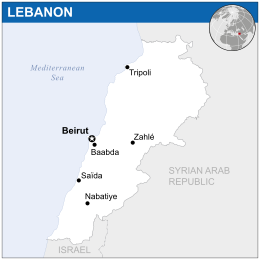More languages
More actions
| Lebanese Republic الجمهورية اللبنانية | |
|---|---|
 | |
| Capital and largest city | Beirut |
| Official languages | Arabic |
| Leaders | |
• Prime Minister | Najib Mikati |
| Area | |
• Total | 10,452 km² |
| Population | |
• 2021 estimate | 5,592,631 |
Lebanon, officially the Lebanese Republic, is a country in Western Asia bordered by Syria and the Zionist Entity, with a western coast on the Mediterranean Sea. Hezbollah is part of Lebanon's elected government and a member of the Axis of Resistance against US imperialism, Zionism, and ISIS.[1]
History[edit | edit source]
Ottoman rule[edit | edit source]
By the beginning of the 20th century the Ottoman Empire was becoming increasingly subservient to western imperialism with France in particular having a keen interest in Lebanon. When the First World War began in 1914 the Ottomans abolished Lebanese autonomy, imposed recruit levies and enforced compulsory labour. In October 1918 Anglo-French troops occupied Lebanon, essentially starting the process of Lebanon becoming a French colony with a French high commissioner being put in place to govern the territory.[2]
French rule[edit | edit source]
In 1920 the French declared the creation of the state of Greater Lebanon under a French mandate, which was later confirmed by the League of Nations in 1922. In May 1926 a constitution was introduced which proclaimed Lebanon a republic but France continued to control Lebanon's foreign relations and defence whilst subordinating its economy to French monopoly capital.[2]
The people of Lebanon were committed to fighting French colonialism and over the next few years several rebellions broke out against French rule. The people of Lebanon worked together with Syria, also occupied by the French under the Mandate for Syria and the Lebanon, to oppose French imperialism. In 1924 the Syrian–Lebanese Communist Party was established by Syrian and Lebanese communists to lead the national liberation struggle.[2]
Under pressure from the independence movement, France concluded a treaty in November 1936 with the Lebanese, granting independence within three years but with French armed forces staying in Lebanon and giving France the right to intervene in Lebanon as it saw fit. However, when Édouard Daladier came to power in France in 1938, his government blocked the treaty.[2]
Following the outbreak of the Second World War in 1939, martial law was declared, parliament dissolved and the communist party banned. After France's surrender in June 1940, Lebanon came under German and Italian rule who used the territory as a base for operations in Western Asia and for exporting agricultural products. The British imposed a blockade on the country deepening an economic crisis before Anglo-French forces entered Lebanon on June 8,1941, liberating Lebanon from fascist rule. Forced to accept the demands of the liberation movement, on November 26, 1941, French general Georges Catroux announced on behalf of France that Lebanon would be independent.[2]
Independence[edit | edit source]
On November 8, 1943, the Lebanese government removed all articles from the consitution that granted the French Mandate control in Lebanon. France responded to this by imprisoning President Bishara al-Khuri, Prime Minister Riyad al-Solh and the rest of the Lebanese government as well as dissolving the parliament and declaring the constitution no longer in effect. However, on November 22, France was pressured into restoring the legal government by the people of Lebanon. The bourgeois government was then able to consolidate its position, declare war on the Axis and join the United Nations and League of Arab States.[3]
Even after independence France still continued to try and maintain its position in Lebanon with a new contingent of French troops arriving in May 1945. The French representative demanded that Lebanon sign a treaty guaranteeing France's imperial interests but the Lebanese refused and a resistance movement began with Soviet support. In December the French concluded a treaty with the British to keep troops occupying Lebanon indefinitely but the UN intervened and forced the imperialists to withdraw their troops, which was completed on December 31, 1946.[3]
Anti-Zionist resistance[edit | edit source]
Zionist forces attacked and occupied southern Lebanon in 1982 and occupied Beirut.[4] In July 1993, they began bombing southern Lebanon and created 300,000 refugees.[5] They expelled the PLO from Lebanon, but resistance forces led by Hezbollah drove out the invader by 2000.[4]
Israel killed over 2,000 people in 2006 when it bombed Lebanon again.[1]
After the assassination of Prime Minister Rafiq Hariri in 2005, his son Saad Hariri came to power as leader of the Saudi-backed Future Movement. He is supporting jihadist groups including al-Qaeda to be used against the Axis of Resistance.[6]
References[edit | edit source]
- ↑ 1.0 1.1 Ben Norton (2020-08-13). "How the US helped push Lebanon to the brink of collapse, and now threatens more sanctions" The Grayzone. Archived from the original on 2022-07-19. Retrieved 2022-11-01.
- ↑ 2.0 2.1 2.2 2.3 2.4 S. P. Kiktev (1979). The Great Soviet Encyclopedia: 'Lebanon; From the early 16th century to independence'.
- ↑ 3.0 3.1 S. P. Kiktev (1979). The Great Soviet Encyclopedia: 'Lebanon; Independence'.
- ↑ 4.0 4.1 Ali Abunimah (2024-09-28). "Hasan Nasrallah died on the road to liberate Palestine" The Electronic Intifada. Archived from the original on 2024-10-07.
- ↑ Michael Parenti (2000). To Kill a Nation: 'Hypocritical Humanitarianism' (p. 12). [PDF] Verso.
- ↑ William Van Wagenen (2022-09-12). "Saad Hariri and the collapse of Lebanon" The Cradle. Archived from the original on 2022-09-15. Retrieved 2022-09-15.


